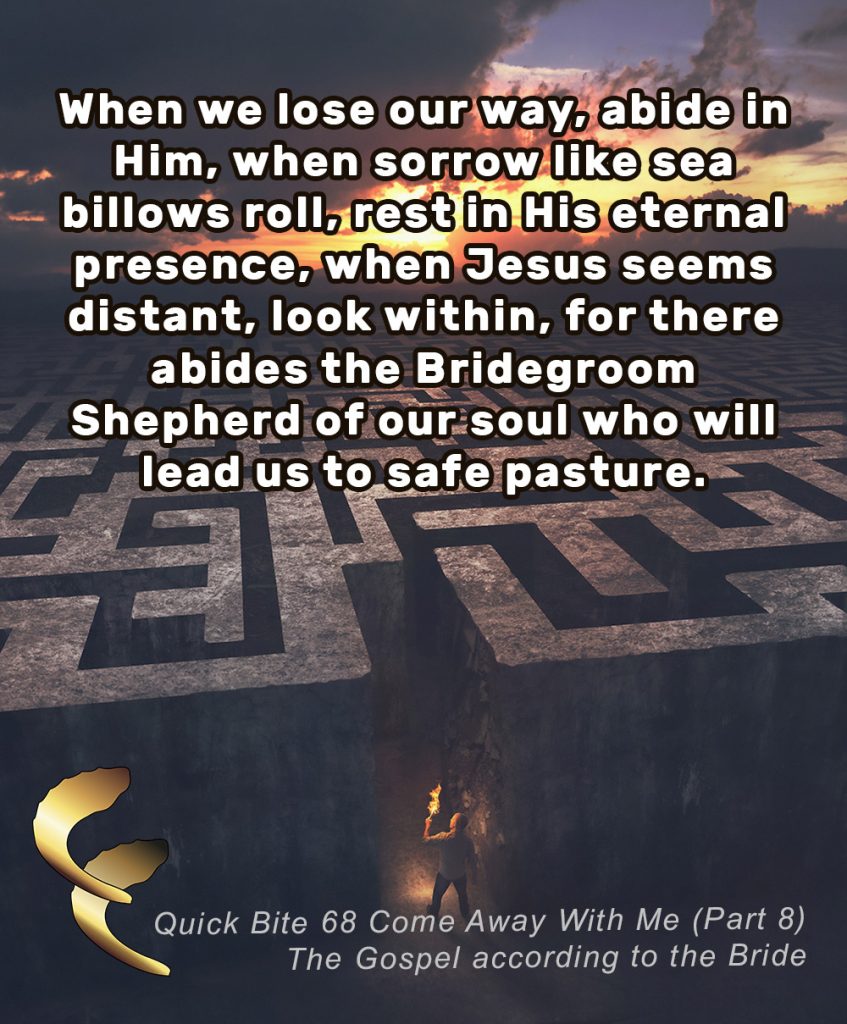“(6) I opened for my beloved, But my beloved had turned away [and] was gone. My heart leaped up when he spoke. I sought him, but I could not find him; I called him, but he gave me no answer. (7) The watchmen who went about the city found me. They struck me, they wounded me; The keepers of the walls Took my veil away from me.” – Sng 5:6-7 NKJV
For all we might conclude from the Shulamite’s ignominy, the truth retains her willingness to suffer much in the face of danger and persecution in love’s pursuit. Night brought not the safety of a comfortable encounter seclusion would have procured, instead her destiny the bare and brutal exposure of devotion which cost dearly. That’s because the diligent search of her Beloved through city streets was not acceptable to the watchmen on their duty nor the keepers of the walls. I suppose her intentions were sorely mistaken for a woman of the night, and they took offence at her, or perhaps they questioned her infidelity to Solomon as she called upon another they did not know. Whatever crime they assumed; her wounds were undeserved. There are some profound parallels here with our Lord’s Passion. For His unrelenting love brought upon Him the cruelty of undeserved punishment from those entrusted as guardians of their ancestral faith and observances, when He too was struck, wounded and stripped before His ultimate atoning sacrifice upon the Cross.
“(3) He is despised and rejected by men, A Man of sorrows and acquainted with grief. And we hid, as it were, [our] faces from Him; He was despised, and we did not esteem Him. (4) Surely He has borne our griefs And carried our sorrows; Yet we esteemed Him stricken, Smitten by God, and afflicted. (5) But He [was] wounded for our transgressions, [He was] bruised for our iniquities; The chastisement for our peace [was] upon Him, And by His stripes we are healed.” – Isaiah 53:3-5 NKJV
There is something here we must heed, and why I write as I do. Before us, an unavoidable yet fundamental necessity we must embrace if we are ever to be His glorious Bride without spot or wrinkle. The anointing of myrrh studied previously in this series is an invitation into the wounds of Christ. This is twofold. First, by faith to know the crucified Saviour, second (as Paul writes in Php 3:10,11) “to participate in His sufferings, becoming like Him in His death, and so somehow, attaining to the resurrection from the dead.” Do you remember after the resurrection when Thomas missed Jesus visit the disciples? They reported to him their wonderful news saying, “We have seen the Lord!”, but he replied, “Unless I see the nail marks in his hands and put my finger where the nails were, and put my hand into his side, I will not believe.” John 20:25 Then a week later Jesus appeared to them again, this time Thomas was among them, and Jesus said to him “Put your finger here; see my hands. Reach out your hand and put it into my side. Stop doubting and believe.” John 20:27 NIV. We quickly dismiss Thomas as the doubter, the one needing additional reassurance because of his lack of faith, but I believe more is happening here than admonition. Did you know it was not only Thomas who doubted the resurrected Christ? Luke 24:36-49 gives the account and recalls how all of the disciples were troubled with doubts in their minds when Jesus appeared to them (Luke 24:38). Jesus invites, “(39) Look at my hands and my feet. It is I myself! Touch me and see; a ghost does not have flesh and bones, as you see I have.” (40) When he had said this, he showed them his hands and feet.” – Luke 24:39-40 NIV
There’s a lot going on here, but the point I’m making is we are invited to touch the wounds of Christ, because it is through His wounds we might believe and know His resurrection working most powerfully in us (Romans 6:3-5).
When you place your hand into wounds of Christ something deeply intimate is invoked. It is an invitation into Christ as His bride.
Over the years, the Bride has had many enemies: abused, misunderstood and wounded, she has suffered much. Furthermore, a time will come and is already here when the Bride will not be tolerated at all by the “watchmen in the city” or “keepers of the walls”. She is an offence to them. They neither know the Bridegroom nor where He might be. And yet, the Shulamite’s example challenges any defensibility of compromise and confronts most undeniably any lukewarm demeanour lurking in the Laodicean Church. Like faith, love must be proven, and often the test is suffering. Yet adversity to the humble and wise is a door to maturity and an invitation to spiritual growth. Here then lies the heart of the matter. We are presented with a choice: Choose this perilous venture in pursuit of love the hour of its awakening or decline the invitation to “come away with me” altogether. There was not the demand made to the Shulamite only the invitation urged. She was not required to leave her repose, yet her heart compelled it. Likewise, we should arise from passivity to our Bridegroom’s call casting aside the fear of consequence or the imposition of respectability as King David once avowed:
“(22) I will become even more undignified than this, and I will be humiliated in my own eyes. But by these slave girls you spoke of, I will be held in honour.”” – 2 Samuel 6:22 NIV
Such exposure when we take off the apparel not befitting a Bride will posture us most beautifully in our Bridegroom’s eyes and be held in honour by others on their bridal journey. This necessity of vulnerability brings the inevitability of being wounded, but if in some way my suffering should glorify Him how can I refuse? Or if by my wounds the nature of Christ is perfected in me, what shall I say? Should I not embrace the fellowship of sharing in His suffering if, by the same means, I might know Him more? Yes, let my soul arise and sing the song of the Bride, who has forsaken all things in seeking the One whom her soul loves in response to His call upon her heart “Come away with me”. The tragedy in this particular passage (Song of Songs 5:2-7), is that the Bride did not know where to find the Bridegroom. Despite already her assurance of where she might find him at midday (Song Of Songs 1:7,8), this was now the night and the immediacy of His visitation diverted her attention away from the verdant pastures of previous instruction in the hope of finding him in the city. After all, she had found him there before
1 The Shulamite By night on my bed I sought the one I love; I sought him, but I did not find him. 2 “I will rise now,” [I said,] “And go about the city; In the streets and in the squares I will seek the one I love.” I sought him, but I did not find him. 3 The watchmen who go about the city found me; [I said,] “Have you seen the one I love?” 4 Scarcely had I passed by them, When I found the one I love. I held him and would not let him go, Until I had brought him to the house of my mother, And into the chamber of her who conceived me. Song of Songs 3:1-4 (NKJV)
Like the Shulamite the Bride has gone out into the night risking everything for love and many have been wounded in the pursuit by those she should have been able to trust. What do we do when Jesus isn’t where we expect to find Him or where we once knew Him before? What do we do when the seasons change and what we once held trustworthy has become to us the very source of our pain? What do we do when our vulnerability and exposure invite the cruelty of others, even those commissioned with our safety? In this Quick Bite series I have sought to answer those questions by drawing our attention to the quality of our inner spiritual life and nurture a lifestyle of intimacy. Because unlike the Shulamite, we are never alone, and though we may seek Him in the city, remember first of all Jesus lives in us. When we lose our way, abide in Him, when sorrow like sea billows roll, rest in His eternal presence, when Jesus seems distant, look within, for there abides the Bridegroom Shepherd of our soul who will lead us to safe pasture. There is a restoration coming to the Bride. She has gone out into the city and been wounded, but the Lord has come to lead her beside the still waters and restore her soul.

“(1) A Psalm of David. The LORD [is] my shepherd; I shall not want. (2) He makes me to lie down in green pastures; He leads me beside the still waters. (3) He restores my soul; He leads me in the paths of righteousness For His name’s sake. (4) Yea, though I walk through the valley of the shadow of death, I will fear no evil; For You [are] with me; Your rod and Your staff, they comfort me. (5) You prepare a table before me in the presence of my enemies; You anoint my head with oil; My cup runs over. (6) Surely goodness and mercy shall follow me All the days of my life; And I will dwell in the house of the LORD Forever.” – Psalm 23:1-6 NKJV






